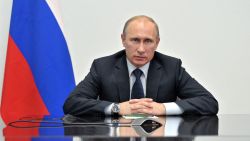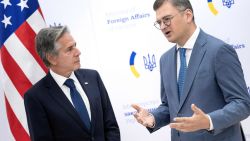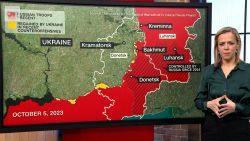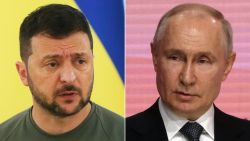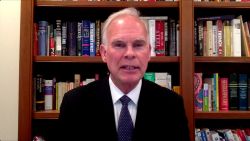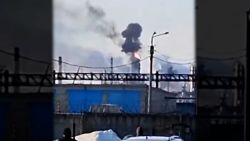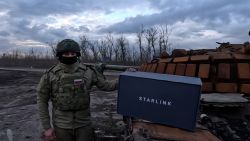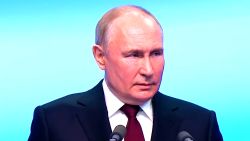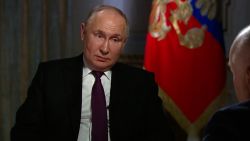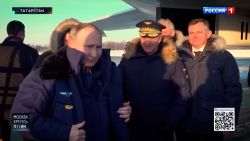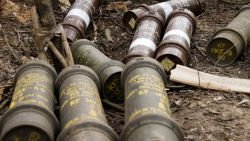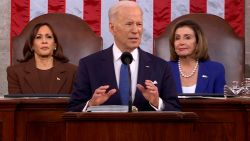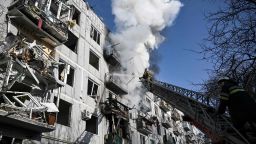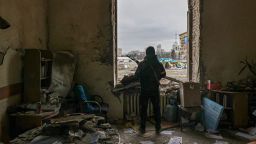Editor’s Note: Douglas London is the author of “The Recruiter: Spying and the Lost Art of American Intelligence.” He teaches intelligence studies at Georgetown University’s School of Foreign Service and is a nonresident scholar at the Middle East Institute. London served in the CIA’s Clandestine Service for over 34 years, mostly in the Middle East, South and Central Asia and Africa, including three assignments as a Chief of Station. Follow him on Twitter @DouglasLondon5. The opinions expressed in this commentary are his own. View more opinion at CNN.
Has Vladimir Putin gone mad? How else could the Russian President have so recklessly placed the world on the precipice of the unthinkable, with what outside the Kremlin is seen as an unjustified and unwinnable war in Ukraine?

Yes, unwinnable, in that even should Russian troops replace Ukraine’s democratic government at bayonet point with a Russian puppet and occupy the country, the Kremlin faces a bloody insurgency and crushing economic consequences.
Putin might yet realize his greatest fear of a grassroots movement that deposes him – and it could come from what he has set in motion with his own hand. But, as a longtime watcher of Russia, I doubt Putin has lost his mind, but rather, is so ill informed as to be basing his calculus on intelligence that bears little resemblance to reality.
The caution voiced by many, including Gabriel Garcia Marquez, that “it is easier to start a war than to end it” should not have been lost on Putin.
He is a student of history, warped as his understanding of the past might be. If it is Putin’s perception of Russia’s humiliations that is driving him to rewrite history, that motivation might actually be less compelled by ego and more by his practical concern about the existential threat he believes will destroy him if left unchecked.
Putin’s intentions
Putin could not sustain power, nor his allegedly ill-gotten riches, in a genuinely democratic Russian state. Well in advance of temporarily leaving the presidency in 2008, turning over the post to de facto caretaker and titular head Dmitry Medvedev, the Russian leader made his intentions clear.
In 2005, Putin declared in his annual state of the union address to parliament that the collapse of the Soviet empire “was the greatest geopolitical catastrophe of the century” and was an “epidemic” fostering separatist movements that had “spilled over to Russia itself.”
His December 2021 comments on historical Russia’s demise were the natural follow-up to his March 2018 statement to reporters that he would reverse the Soviet Union’s collapse, if he could.
Putin, formerly of the KGB, is a trained intelligence officer. He is obsessed with control. An intelligence officer strives to establish power over everyone and everything, including the narratives by which they are perceived, so as to control the ensuing actions of others.
There is much theater to this trade, as reflected in Putin’s fiery speeches and the public portrayal of his virility, the absolute subordination of Russia’s most senior officials and the country’s feeding a mystique of overwhelming military power.
Putin’s theatrical direction of placing Russian nuclear forces on alert was aimed at domestic audiences – his, and those in the West. It was choreographed to provoke a reciprocal response and support his narrative.
Russia, he contends, is the victim of an aggressor’s attack, and striking first, and strongest, is an act of preemption and self-defense. If it was designed to push back against a credible US military threat, he need not have made the order public.
Were Russian forces put on such alert, US intelligence agencies would have immediately detected indications. When the US placed its own nuclear forces on alert in response to Russian military actions during the 1973 Arab-Israeli war, the Nixon White House made no public announcement. But the US did deliberately relay orders across its military and security structure in the open so that Russia’s leadership would quickly get the message.
Putin’s is an activist philosophy that seeks to leave nothing to chance and seizes the initiative so as to force his foes to react to circumstances he aims to dictate. But all of that depends on good intelligence. You build a house of cards when a plan is constructed without awareness of its potential flaws and vulnerabilities.
Not what he expected
While it’s too early to judge how things will turn out in the end in Ukraine, there’s little debate that Putin’s war has not gone the way he may have expected, or as well as he would have liked.
No one can read Putin’s mind, but the narrow prism we’re allowed paints the picture of a leader who has created a royal court of sycophants unwilling to provide news he does not want to entertain. He has filled the country’s key posts with siloviki, powerful politicians with backgrounds in Russia’s intelligence services, largely the former KGB.
But there’s no honor among thieves, or in this case, the former spies whom Putin relies on, owing to confidence in his ability to manipulate and control them. They are indulged to plunder the country’s resources and swell their wallets with incentives to secure loyalty, rather than intrinsic trust.
Putin’s recent and possibly staged national security council meeting, likely scripted, taped and perhaps edited as it was, offered a revealing glimpse. And bureaucracies, which Putin’s intelligence, security and defense agencies ultimately are, reflect the direction and example of their own leaders.
Seemingly paranoid over his own security, it’s evident Putin’s self-isolation and mercurial manner has fostered a degree of self-censorship and spin across those on whom he depends to provide an accurate depiction of the world outside.
In this atmosphere, how transparent would Defense Minister Sergei Shoigu and Chief of Army Staff Valery Gerasimov be concerning the armed forces’ combat and logistical capabilities? If the Russian losses are even a fraction of that being depicted in the media, it would still be on a pace severalfold of that the US incurred over 20 years in Afghanistan, Iraq and Syria.
Little is heard publicly from Russian Main Intelligence Directorate Chief (GRU) Admiral Igor Olegovich Kostyukov. A noted hardliner who ostensibly shares Putin’s vision and whose organization, specifically Unit 29155, has been linked to assassinations, sabotage and support to insurgencies overseas, he might be heard from even less.
If Russia’s strategy in the first days of the war reflected GRU assessments suggesting the Russian army would sweep across Ukraine with little resistance from an indifferent, if not sympathetic, pro-Russia population, Kostyukov’s star could be on the decline.
Having watched the Director of the Russian Foreign Intelligence Service (SVR), Sergey Naryshkin, and his Federal Security Service (FSB) counterpart Alexander Bortnikov, cower and fumble in Putin’s presence on television, I think it’s unlikely they would have cautioned him over the Ukrainian resolve to fight and the potentially crushing economic response of the world’s most powerful liberal democracies.
Watching Putin
As the world breathlessly watches, Putin’s actions are undermining assumptions that long defined great power competition. “Mutual Assured Destruction,” for example, might no longer offer the reliable guardrail once thought.
Putin publicly endorsed a revised Russian nuclear deterrent policy that allows him to use atomic weapons in response to a conventional strike targeting the nation’s critical government and military infrastructure. And Belarus just announced a referendum changing its law to allow the country to host nuclear weapons, a probable precursor to Putin’s deployment of mobile, intermediate range nuclear missiles closer to NATO borders.
Notwithstanding my possible bias as a 34-year CIA Clandestine Service veteran who long pursued the Russian target, better insight into Putin’s aspirations, intentions and the intelligence upon which he is making decisions will depend more on people than on our vaunted technological prowess.
High resolution spy satellites enable us to count the Russian troops, see their formations and assess their weaponry. And listening posts monitor the volume of communication, and perhaps even some of its content.
But technology cannot answer the most important questions for Ukraine. What is Vladimir Putin thinking? His intent? His endgame? And how can we help the public discern truth from disinformation on the ground?
Some of what insight the US and its allies had into the Kremlin’s thinking reportedly was lost when a CIA agent with access to Putin was endangered by a leak five years ago. The compromise was former President Donald Trump’s, who discussed classified information in a May 2017 Oval office meeting with Russian Foreign Minister Sergey Lavrov and then-Russian Ambassador to the US Sergey Kislyak.
Addressing such gaps, CIA Director William Burns declared his commitment to realign the agency from counterterrorism to traditional intelligence collection against strategic adversaries. His stated priorities have been China, technology, Russia and strengthening the agency’s workforce.
The CIA has its work cut out for it in overcoming the last 20 years of underinvestment in traditional foreign espionage in a much tougher environment than James Bond ever faced, and nurturing well-placed agents takes time. Despite former President Trump’s personal sentiments, though, I expect the CIA never really stopped working Russia.
Russia’s initial, relative restraint in guarding against civilian casualties was certainly predicated on the complications Putin hoped to avoid in ruling Ukraine and suppressing an insurgency after seizing the capital and replacing its government. But he will likely grow desperate to reestablish control and achieve military victory.
Justifiably concerned at how the prolonged conflagration and resulting Russian casualties will play at home, Putin could increasingly apply the brutal tactics seen in the Syria war by levelling urban centers and wielding thermobaric weapons and cluster munitions in indiscriminate targeting.
Countering Putin and his siloviki requires understanding them with intelligence from insiders and resistance to an emotional component that suggests recklessness on the Russian leader’s part.
It’s brutal, illogical to us, and therefore unpredictable. But US intelligence succeeded in anticipating his move on Ukraine not by judging Putin irrational, but rather, by examining his calculus, ill-informed as it has been, and the circle of advisers, incapable as they seem to be, on which he is relying to make his decisions.
Putin is likely to continue to escalate his war in Ukraine, fearing most of all that he could lose control of Russia. Whether he truly understands that the war itself puts him at risk is an all-important question.

